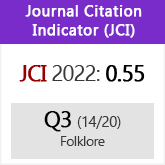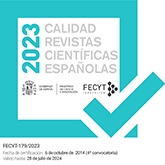Copla y supervivencia: Conchita Piquer, “Tatuaje”, y el duelo de los vencidos
DOI:
https://doi.org/10.3989/rdtp.2011.19Palabras clave:
Conchita Piquer, “Tatuaje”, Vencidos, Supervivencia, Duelo complicado, RitualResumen
El presente estudio es una lectura de “Tatuaje” (1941), la copla más emblemática de Conchita Piquer, a la sombra de las fosas comunes del terror franquista. Numerosos intelectuales que crecieron durante la posguerra han dejado elocuente testimonio de la pasión con que los vencidos cantaban esta canción. Valiéndome de los recientes documentales que recogen el testimonio de los superviventes del terror franquista sobre el sufrimiento psicológico que supuso la prohibición de enterrar a sus familiares ni llevar a cabo ningún ritual de duelo por ellos, sostengo que “Tatuaje” tuvo tanto impacto porque funcionaba durante toda la posguerra como un ritual clandestino de duelo, un duelo bajo la clave de la historia de la mujer del puerto y su marinero. Interpreto la canción como una representación de, y terapia contra, el llamado “duelo complicado.” Y argumento que “Tatuaje” también ayudó a los vencidos a resolver un problema existencial: el de ser fantasmas de una época anterior, de no tener papel en la “España nueva” franquista.
Descargas
Citas
Acosta Díaz, J.; M. J. Gómez Lara y J. Jiménez Barrientos (eds.). 1997. Poemas y canciones de Rafael de León. 3ª. ed. Sevilla: Ediciones Alfar.
Alarcos Llorach, E. 2006. “Tatuaje: Un acercamiento a la copla”. Clarín 65: 3-11.
Andersen-Warren, M. y R. Grainger. 2000. Practical Approaches to Dramatherapy: The Shield of Perseus. Londres: Jessica Kingsley Publishers.
Armengou, M. y R. Belis 2003. Les fosses del silenci. Part 2. DVD. Enciclopedia Catalana and Televisió de Catalunya.
Armengou, M. y R. Belis 2003. Els nens perduts del franquisme. Parts 1 and 2. DVD. Enciclopedia Catalana and Televisió de Catalunya.
Armengou, M. y R. Belis 2004. Las fosas del silencio: ¿Hay un holocausto español? Barcelona: Plaza y Janés.
Bermúdez, S. 1997. “”Music to My Ears”: Cuples, Conchita Piquer, and the (Un)making of Cultural Nationalism”. Siglo XX/20th Century 15 (1-2): 33-54.
Casanova, J. 2002. “Una dictadura de cuarenta años”, en J. Casanova (ed.), Morir, matar, sobrevivir: 3-52. Barcelona: Crítica.
Cenarro Lagunas, A. 2006. La sonrisa de Falange: Auxilio Social en la guerra civil y en la posguerra. Barcelona: Crítica.
Colmeiro, J. F. 2005. Memoria histórica e identidad cultural: De la postguerra a la postmodernidad. Barcelona: Anthropos. PMid:15385091
Cone, J. H. 1991. The Spirituals and the Blues: An Interpretation. Nueva York: Orbis Books.
Doka, K. J. 1989. “Disenfranchised Grief”, en K. J. Doka, Disenfranchised Grief: Recognizing Hidden Sorrow: 3-12. Lexington, MA: Lexington Books.
Ebert, A. y M. J. Dyck. 2004. “The experience of mental death: The core feature of complex posttraumatic stress disorder”. Clinical Psychology Review 24: 617-635. http://dx.doi.org/10.1016/j.cpr.2004.06.002
Ferres, A. 2005. Los vencidos. Madrid: Gadir.
Frankl, V. 1963. Man’s Search for Meaning: An Introduction to Logotheraphy. Nueva York: Pocket Books.
Gennep, A. van. 1960. The Rites of Passage. Chicago: The University of Chicago Press.
Goleman, D. 1995. Emotional Intelligence. Nueva York: Bantam.
Graham, H. 1995. “Popular Culture in the Years of Hunger”, en H. Graham y J. Labanyi (eds.), Spanish Cultural Studies. An Introduction: 237-245. Oxford: Oxford University Press.
Harrison, R. P. 2003. The Dominion of the Dead. Chicago-Londres: University of Chicago Press. PMid:9210739
Horowitz, M. J., y otros. 1997. “Diagnostic Criteria for Complicated Grief Disorder”. American Journal of Psychiatry 154 (7): 904-10. PMid:11503665
Jacobs, S. y H. Prigerson. 2000. “Psychotherapy of Traumatic Grief: A Review of Evidence for Psychotherapeutic Treatments”. Death Studies 24 (6): 479-95. http://dx.doi.org/10.1080/07481180050121462
Juliá, S. (ed.). 1999. Victimas de la Guerra Civil. Madrid: Temas de Hoy.
Kohen, C. 1988. “Political Traumas, Oppression, and Rituals”, en E. Imber-Black, J. Roberts y R. Alva Whiting (eds.), Rituals in Families and Family Therapy: 363-383. Nueva York: W. W. Norton & Co., Inc.
Labanyi, J. 2002. “Musical Battles: Populism and Hegemony in the Early Francoist Folkloric Film Musical”, en J. Labanyi (ed.), Constructing Identity in Contemporary Spain: 206-221. Nueva York: Oxford University Press.
Littrell, J. 1998. “Is the Reexperience of Painful Emotion Therapeutic?”. Clinical Psychology Review 18 (1): 71-102. http://dx.doi.org/10.1016/S0272-7358(97)00046-9
Martín Gaite, C. 1990. El cuarto de atrás. Madrid: Ediciones Destino.
Martín Patino, B. 2003 [1971]. Canciones para después de una guerra. DVD. Diario El País.
Mira Nouselles, A. 2004. De Sodoma a Chueca: Una historia cultural de la homosexualidad en España en el siglo XX. Barcelona: Editorial Egales.
Pennebaker, J. W. y J. R. Sussman. 1988. “Disclosure of Traumas and Psychosomatic Process”. Social Science and Medicine 26: 327-332. http://dx.doi.org/10.1016/0277-9536(88)90397-8 PMid:3372832
Pennebaker, J. W.; J. K. Kiecolt-Glaser, y R. Glaser. 1988. “Disclosure of Trauma and Immune Function Health Implications for Psychotherapy”. Journal of Consulting and Clinical Psychology 56 (2): 239-245. http://dx.doi.org/10.1037/0022-006X.56.2.239 PMid:9137115
Prigerson, H. G., y otros. 1997. “Traumatic Grief as a Risk Factor for Mental and Physical Morbidity”. American Journal of Psychiatry 154 (5): 616-23. PMid:12440418
Prigerson, H. G., y otros. 2002. “Rates and Risks of Complicated Grief among Psychiatric Patients in Karachi, Pakistan”. Death Studies 26 (10): 781-92. http://dx.doi.org/10.1080/07481180290106571
Rando, T. A. 1993. Treatment of Complicated Mourning. Champaign, IL: Research Press. Recuperando memoria: Concierto-Homenaje a los Republicanos. 2004. Dir. Diego Sabanés. Prod. Contamíname Discos. DVD and CD. El Diablo Distribución.
Reig Tapia, A. 1986. Ideología e historia: Sobre la represión franquista y la Guerra Civil. Madrid: Akal.
Richards, M. 1998. A Time of Silence: Civil War and the Culture of Repression in Franco’s Spain, 1939-1945. Nueva York: Cambridge University Press.
Robben, A. C. G. M. (ed). 2004a. Death, Mourning, and Burial: A Cross-Cultural Reader. Malden, MA: Blackwell.
Robben, A. C. G. M. 2004b. “Death and Anthropology: An Introduction”, en A. Robben (ed.), Death, Mourning, and Burial: A Cross-Cultural Reader: 1-16. Malden, MA: Blackwell.
Robben, A. C. G. M. 2004c. “State terror in the Netherworld: Disappearance and reburial in Argentina”, en A. Robben (ed.), Death, Mourning, and Burial: A Cross-Cultural Reader: 134-148. Malden, MA: Blackwell.
Rodrigo, J. 2005. Cautivos. Campos de concentración en la España franquista, 1936-1947. Barcelona: Crítica.
Sánchez-Carretero, C. 2006. “Train of Workers, Trains of Death: Some Reflections after the March 11 Attacks in Madrid”, en J. Santino (ed.), Spontaneous Shrines and the Public Memorialization of Death: 333-347. Nueva York: Palgrave and MacMillan.
Sánchez-Carretero, C. (coord.). 2011. El Archivo del Duelo. Análisis de la respuesta ciudadana ante los atentados del 11 de marzo en Madrid. Madrid: CSIC.
Sanders, C. M. 1999. Grief: The Mourning After: Dealing with Adult. Bereavement. 2.ª ed. Nueva York: John Wiley & Sons.
Santino, J. (ed.). 2006. Spontaneous Shrines and the Public Memorialization of Death. Nueva York: Palgrave and MacMillan.
Semillas. 2004. Dir. D. Sabanés. Recuperando memoria: Concierto-Homenaje a los Republicanos. Prod. Contamíname Discos. DVD. El Diablo Distribución.
Senie, H. F. 2006. “Mourning in Protest: Spontaneous Memorials and the Sacralization of Public Space”, en J. Santino (ed.), Spontaneous Shrines and the Public Memorialization of Death: 41-56. Nueva York: Palgrave and MacMillan.
Silva, E. 2005. Las fosas de Franco: Crónica de un desagravio. Madrid: Temas de Hoy. ‘Tatuaje.’ Lo mejor de Conchita Piquer. 1987. Madrid: EMI-Odeón.
Umbral, F. 1987. Memorias de un hijo del siglo. Madrid: Ediciones El País.
Van der Hart, O. 1983. Rituals in Psychotherapy. Nueva York: Irvington Publishers.
Vázquez Montalbán, M. 1986. Crónica sentimental de España. Madrid: Espasa-Calpe.
Vázquez Montalbán, M. 1997. Tatuaje. Barcelona: Planeta.
Vázquez Montalbán, M. 2000. Cancionero general del franquismo, 1939-1975. Barcelona: Crítica.
Víctimas todavía. 2003. Dir. J. Sánchez Martínez y P. Sánchez Torres. Prod. A. Quílez Tomás and Castilla-La Mancha Noticias SL. Collifilms Diffusion.
Vinyes, R.; M. Armengou y R. Belis. 2002. Los niños perdidos del franquismo. Barcelona: Plaza & Janés Editores.
Virgilio. 1986. Aeneid. Trans. C.H. Sisson. Manchester: Carcanet.
Woods, E. M. 2003. “Excess, Affect and Emergent Classes: Melodramatic Modes in Mariquilla Terremoto (Benito Perojo 1939) and Filigrana (Luis Marquina 1949)”. Letras Peninsulares 16: 291-315.
Zeitlin, S. 2006. “Oh Did You See the Ashes Come Thickly Falling Down? Poems Posted in the Wake of September 11”, en J. Santino (ed.), Spontaneous Shrines and the Public Memorialization of Death: 99-111. Nueva York: Palgrave and MacMillan.
Descargas
Publicado
Cómo citar
Número
Sección
Licencia
Derechos de autor 2011 Consejo Superior de Investigaciones Científicas (CSIC)

Esta obra está bajo una licencia internacional Creative Commons Atribución 4.0.
© CSIC. Los originales publicados en las ediciones impresa y electrónica de esta Revista son propiedad del Consejo Superior de Investigaciones Científicas, siendo necesario citar la procedencia en cualquier reproducción parcial o total.Salvo indicación contraria, todos los contenidos de la edición electrónica se distribuyen bajo una licencia de uso y distribución “Creative Commons Reconocimiento 4.0 Internacional ” (CC BY 4.0). Puede consultar desde aquí la versión informativa y el texto legal de la licencia. Esta circunstancia ha de hacerse constar expresamente de esta forma cuando sea necesario.
No se autoriza el depósito en repositorios, páginas web personales o similares de cualquier otra versión distinta a la publicada por el editor.















